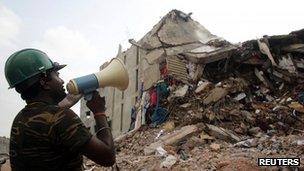UK announces £18m aid for Bangladesh factory workers
- Published

The Rana Plaza collapse was one of the world's worst industrial disasters
The UK is to donate £18m to help train Bangladeshi garment workers, following the collapse of a factory in Dhaka that killed more than 1,100 people.
Minister Alan Duncan announced the aid as he visited those injured when the Rana Plaza building collapsed in April.
He also called on British clothes retailers to "assume responsibility" for the way their products are made.
Mr Duncan said the collapse had been a "wake-up" call and safety standards in Bangladesh needed to be strengthened.
The Rana Plaza collapse was one of the world's worst industrial disasters and sparked global outrage.
The authorities say 1,130 people died, about 2,500 people were injured and 2,437 people were rescued after the disaster.
'From store to sewing machine'
It highlighted working conditions, low wages and safety standards in the country's garment sector; the building housed many operations producing low-cost garments for Western companies.
International Development Minister Mr Duncan visited survivors at a Centre for the Rehabilitation of the Paralysed, supported by UK aid, in Savar, the district where the collapse took place.
He said: "The Rana Plaza factory collapse was devastating in its scale and, along with factory fires, must be taken as a wake-up call to all of us.
"Safety and standards must be made to catch up with the rapid growth in the garment sector, which is a massive success story and must not be allowed to go sour."
He said the UK would provide £18m for safety and skills training for thousands of low-skilled garment workers.
Existing UK aid will be spent on the enforcing building standards and making factories themselves fit for purpose.
Britain will also provide a team of experts to review the country's building inspection system.
Mr Duncan added: "The industry has been built from nothing in the past 30 years and now needs to be turned into a long-term development success, which means that urgent action is needed across the sector.
"Our own high street brands must assume responsibility for their products, from the store right back to the sewing machine, and the UK is ready to help make this happen."
He said the Department for International Development was ready to commit funding towards initiatives that saw buyers, manufacturers, workers, non-governmental organisations and the government of Bangladesh work together to agree a set of common compliance standards.
During his visit Mr Duncan toured the Babylon factory, which produces clothes for Tesco and other UK buyers, and raised the issue of garment workers' conditions at a meeting with Prime Minister Sheikh Hasina.